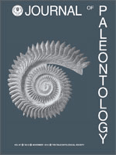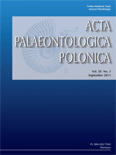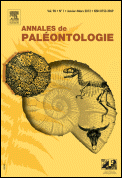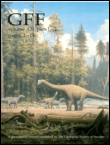
FACIES
metrics 2024
Charting New Territories in Geological Research and Understanding
Introduction
FACIES is a prominent academic journal published by Springer, dedicated to advancing knowledge in the fields of Geology, Paleontology, and Stratigraphy. With its rich history since 1979 and an impactful convergence of research efforts extending through 2024, FACIES has established itself as a vital resource for scholars and practitioners. The journal boasts impressive ranking metrics: it is positioned in Q2 within Geology and Stratigraphy, and Q1 in Paleontology, reflecting its high-quality contributions to the academic community. Furthermore, its notable Scopus ranks—#28 in Paleontology, #16 in Stratigraphy, and #91 in Geology—underscore its influence and relevance. Although not an open-access journal, FACIES continues to provide significant findings that inform geological practices and enrich our understanding of past and present Earth systems. It serves as an essential platform for innovative research, making it invaluable for researchers, professionals, and students who seek to impact the fields of Earth sciences.
Metrics 2024
 0.66
0.66 1.80
1.80 2.00
2.00 64
64Metrics History
Rank 2024
Scopus
IF (Web Of Science)
JCI (Web Of Science)
Quartile History
Similar Journals

Gondwana Research
Exploring the Depths of Gondwana's Geological LegacyGondwana Research is a premier academic journal published by Elsevier, specializing in the field of geology, with a robust focus on the geological history and processes of the Gondwana supercontinent. With an impressive impact factor and ranking as Q1 in the 2023 Geology category, it stands as a leading platform for disseminating high-quality research. The journal features articles that advance the understanding of Earth and planetary sciences, making significant contributions to geological education and research. Researchers will find its curated content particularly valuable, as it encompasses a wide array of topics including stratigraphy, paleontology, and tectonics, all relevant to both contemporary and historical geological inquiries. Given its substantial reach and esteemed standing—ranked 5th out of 321 in its field—Gondwana Research plays a crucial role in fostering scientific exchange among global experts. Located in the United States with publication continuity from 1997 to 2024, this journal consistently attracts submissions from leading scientists, ensuring that its readership is kept at the forefront of geological discovery and innovation.

REVISTA BRASILEIRA DE PALEONTOLOGIA
Fostering Collaboration in the Study of Paleontological WondersREVISTA BRASILEIRA DE PALEONTOLOGIA (ISSN: 1519-7530, E-ISSN: 2236-1715) is a premier academic journal dedicated to the field of paleontology, published by the esteemed SOCIEDADE BRASILEIRA DE PALEONTOLOGIA. Operating under a Q3 quartile ranking in the 2023 Scopus statistics for Paleontology, this journal serves as a vital platform for researchers, professionals, and students to disseminate and engage with cutting-edge discoveries and methodologies in paleontological studies. With a broad scope that encompasses various aspects of Earth's historical life, REVISTA BRASILEIRA DE PALEONTOLOGIA provides an essential resource for the scientific community, particularly those based in Brazil and South America. The journal is committed to promoting rigorous research and fostering collaboration among scholars, ultimately contributing to advancements in the understanding of past biodiversity and extinction events. Its thoughtful curation of articles since 2010 ensures that it remains at the forefront of paleontological scholarship, despite its limited HIndex and open access options. This journal is a crucial asset for anyone looking to deepen their understanding of evolutionary processes that have shaped our planet.

JOURNAL OF PALEONTOLOGY
Illuminating Evolutionary Journeys Through TimeJOURNAL OF PALEONTOLOGY, published by Cambridge University Press, is a leading scholarly journal dedicated to the field of paleontology, featuring a broad scope that covers fossil studies, evolutionary biology, and earth history. With an ISSN of 0022-3360 and an E-ISSN of 1937-2337, this esteemed journal serves as an essential platform for researchers, professionals, and students to disseminate cutting-edge research findings and insights in paleontological science. The journal holds a significant position within its category, ranking Q2 in the 2023 quartiles and achieving a Scopus rank of #51 out of 113 in Earth and Planetary Sciences – Paleontology, placing it in the 55th percentile of its field. Although it does not currently offer open access options, JOURNAL OF PALEONTOLOGY has been a critical contributor to advancing knowledge from its inception in 1979 through to 2024. Its dedication to rigorous research ensures it remains an indispensable resource for those vested in the understanding of ancient life and ecosystems.

NORWEGIAN JOURNAL OF GEOLOGY
Exploring Earth's Mysteries, One Article at a Time.NORWEGIAN JOURNAL OF GEOLOGY, published by the Geological Society of Norway, stands as a vital resource in the fields of geology, geochemistry, petrology, geophysics, oceanography, and paleontology. Since its transition to an Open Access model in 2015, this journal has significantly expanded its reach, allowing for greater dissemination of cutting-edge research and insights. With an ISSN of 2387-5844 and E-ISSN of 2387-5852, the journal is committed to fostering collaboration and knowledge exchange among the scientific community. The journal's categorization in the Q3 quartile across various Earth and Planetary Sciences fields underscores its status as a reputable publication, offering researchers, professionals, and students alike a platform to share their findings and advancements in geology. Continuing through its converged years from 2015 to 2024, the NORWEGIAN JOURNAL OF GEOLOGY plays a crucial role in enhancing our understanding of Earth's processes and materials, making it an important reference for anyone engaged in geoscientific research.

Boletin de la Sociedad Geologica Mexicana
Connecting Global Insights with Regional ExpertiseBoletin de la Sociedad Geológica Mexicana is a prestigious open-access journal published by the Universidad Nacional Autónoma de México through its Institute of Geography. As a prominent platform in the field of Earth and Planetary Sciences, this journal has been disseminating valuable research since 1904, facilitating the sharing of knowledge among researchers, professionals, and students alike. With a significant impact on the scientific community, it is categorized in the third quartile (Q3) of Earth and Planetary Sciences, and continues to uphold a commitment to accessible science during its current converged years from 2008 to 2024. Positioned in Mexico, it plays a crucial role in addressing regional geological studies while contributing to global scientific discourse. The journal’s emphasis on high-quality, peer-reviewed articles demonstrates its importance as a reliable resource for advancing geological research and education.

E&G Quaternary Science Journal
Bridging Disciplines in Quaternary ScienceE&G Quaternary Science Journal, published by COPERNICUS GESELLSCHAFT MBH in Germany, stands as a prominent open-access platform dedicated to disseminating high-quality research in the fields of archaeology, geology, paleontology, and stratigraphy since its inception in 1979. With its ISSN 0424-7116 and E-ISSN 2199-9090, the journal has achieved remarkable recognition, indicated by its Q1 quartile ranking in archaeology across both arts and humanities sections, and its strong placements within the social sciences and Earth sciences categories. The journal provides crucial insights into the Quaternary period, contributing to our understanding of climate change, human evolution, and geological processes, making it invaluable for researchers, professionals, and students engaged in these collaborating disciplines. As an open-access journal since 2008, it ensures that cutting-edge research is readily available to a global audience, promoting knowledge exchange and facilitating advancements within the scientific community. The continuous commitment to excellence and its strategic focus on high-impact research positions E&G Quaternary Science Journal as a cornerstone publication in quaternary science.

ACTA PALAEONTOLOGICA POLONICA
Advancing Knowledge in Paleontological SciencesACTA PALAEONTOLOGICA POLONICA is a leading scholarly journal in the field of paleontology, published by the Institute of Paleobiology, Polish Academy of Sciences. With its open access model established since 1956, the journal ensures that vital research related to Earth's history and the evolution of life is freely accessible to a global audience. Based in Warsaw, Poland, this journal has garnered a respectable impact within the academic community, currently positioned in the Q2 quartile of its field and ranking #47 out of 113 in Scopus for Earth and Planetary Sciences, reflecting its significance in advancing paleontological research. Covering a wide range of topics related to fossil studies and evolutionary biology, ACTA PALAEONTOLOGICA POLONICA serves as a crucial platform for researchers, professionals, and students alike, encouraging the dissemination of innovative ideas and discussions that contribute to our understanding of past life on Earth. As it continues to publish high-quality articles through to 2024 and beyond, this journal remains integral to the ongoing discourse in paleontological sciences.

ANNALES DE PALEONTOLOGIE
Connecting Researchers to the Depths of TimeANNALES DE PALEONTOLOGIE is a distinguished academic journal published by MASSON EDITEUR that plays a pivotal role in the field of paleontology. With an ISSN of 0753-3969 and an E-ISSN of 1778-3666, this journal has been a vital resource since its inception in 1988, continuously contributing to the advancement of knowledge in Earth and Planetary Sciences, particularly focusing on paleontological research. Currently ranked #68 out of 113 in its category by Scopus, and celebrated for its Q2 quartile standing, ANNALES DE PALEONTOLOGIE publishes innovative studies, reviews, and discussions that appeal to a diverse audience of researchers, professionals, and students. The journal aims to foster a deeper understanding of paleontological phenomena and encourages interdisciplinary collaboration within the scientific community. Although it is not an open access journal, its commitment to scholarly excellence ensures that the content is highly regarded and widely referenced in academic circles. Situated in Issy-les-Moulineaux, France, it continues to maintain a global readership while promoting significant advancements in paleontological research.

GFF
Innovative Discoveries in Geology and Paleontology Await.GFF is a prestigious academic journal dedicated to advancing research in the fields of Geology and Paleontology. Published by Taylor & Francis Ltd in the United Kingdom, GFF serves as a vital platform for disseminating innovative findings and fostering discussions among researchers, professionals, and students alike. With a noteworthy impact factor reflecting its significance in the scientific community, GFF has achieved Q2 ranking in both Geology and Paleontology, underscoring its commitment to high-quality scholarship. The journal has been operational since 1872, accumulating a rich history of contributing to our understanding of earth sciences. It currently ranks #133 out of 321 in Earth and Planetary Sciences - Geology, and #50 out of 113 in Paleontology according to Scopus rankings. Although it does not offer an open access option, GFF remains accessible through various academic databases, ensuring that cutting-edge research reaches a wide audience. Its comprehensive scope aims to explore critical advancements in geological and paleontological sciences, making it an essential resource for those committed to exploring the intricacies of our planet’s past and present.

Swiss Journal of Geosciences
Connecting Researchers to the Heart of Earth ScienceSwiss Journal of Geosciences is a prestigious academic journal dedicated to advancing the field of geosciences, published by SPRINGER INTERNATIONAL PUBLISHING AG. Since its inception in 2007, the journal has established itself as a leading platform for disseminating high-quality research findings in various domains related to Earth and planetary sciences, achieving a notable Q1 ranking in Geology as of 2023. With a solid reputation reflected in its Scopus ranking of Rank #72/321, the journal stands in the 77th percentile within its category. Based in Switzerland, the Swiss Journal of Geosciences embraces an open access model, making it easier for researchers, professionals, and students worldwide to access vital geological research without barriers. The journal’s objectives include promoting interdisciplinary research and fostering insights that address both fundamental and applied geoscientific problems, ensuring it remains a crucial resource for those seeking to understand our planet’s dynamics. Engage with pioneering research and contribute to the vibrant community of geoscientists by exploring the impactful articles published within its pages.